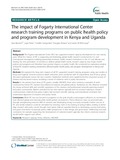| dc.description.abstract | Abstract
Background
The Fogarty International Center (FIC) has supported research capacity development for over twenty years. While the mission of FIC is supporting and facilitating global health research conducted by U.S. and international investigators, building partnerships between health research institutions in the U.S. and abroad, and training the next generation of scientists to address global health needs, research capacity may impact health policies and programs and therefore have positive impacts on public health. We conducted an exploratory analysis of how FIC research training investments affected public health policy and program development in Kenya and Uganda.
Methods
We explored the long term impacts of all FIC supported research training programs using case studies, in Kenya and Uganda. Semi-structured in-depth interviews were conducted with 53 respondents and 29 focus group discussion participants across the two countries. Qualitative methods were supplemented by structured surveys of trainees and document review, including a review of evidence cited in policy documents.
Results
In the primary focal areas of FIC grants, notably HIV/AIDS, there were numerous examples of work conducted by former FIC trainees that influenced national and global policies. Facilitators for this influence included the strong technical skills and scientific reputations of the trainees, and professional networks spanning research and policy communities. Barriers included the fact that trainees typically had not received training in research communication, relatively few policy makers had received scientific training, and institutional constraints that undermined alignment of research with policy needs.
Conclusions
While FIC has not focused its programs on the goal of policy and program influence, its investments have affected global and national public health policies and practice. These influences have occurred primarily through strengthening research skills of scientists and developing strong in-country networks. Further success of FIC and similar initiatives could be stimulated by investing more in the training of policy-makers, seeking to better align research with policy needs through more grants that are awarded directly to developing country institutions, and grants that better incorporate policy maker perspectives in their design and governance. Addressing structural constraints, for example supporting the development of national research agendas that inform university research, would further support such efforts. | |


